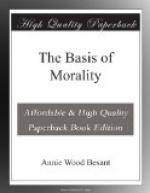At a higher stage, love of God and the wish to “please Him” by leading an exemplary life is a motive offered by religion, and this inspires to purity and to self-sacrifice; again, this is no more ignoble than the wish to please the father, the mother, the friend. Many a lad keeps pure to please his mother, because he loves her. So religious men try to live nobly to please God, because they love Him. At a higher stage yet, the good of the people, the good of the race, of humanity in the future, acts as a potent inspiration. But this does not touch the selfish lower types. Hence Utility fails as a compelling power with the majority, and is insufficient as motive. Add to this the radical fault that it does not place morality on a universal basis, the happiness of all, that it disregards the happiness of the minority, and its unsatisfactory nature is seen. It has much of truth in it; it enters as a determining factor into all systems of ethics, even where nominally ignored or directly rejected; it is a better basis in theory, though a worse one in practice, than either Revelation or Intuition, but it is incomplete. We must seek further for a solid basis of morality.
* * * * *
IV
EVOLUTION
We come now to the sure basis of morality, the bedrock of Nature, whereon Morality may be built beyond all shaking and change, built as a Science with recognised laws, and in a form intelligible and capable of indefinite expansion. Evolution is recognised as the method of Nature, her method in all her realms, and according to the ascertained laws of Nature, so far as they are known, all wise and thoughtful people endeavour to guide themselves. In making Morality a Science, we give it a binding force, and render it of universal application; moreover, we incorporate into it all the fragments of truth which exist in other systems, and which have lent to them their authority, their appeal to the intellect and the heart.




